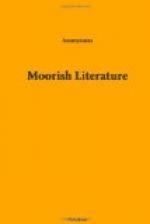“Why won’t you eat?” asked the merchant. “Could your mother have been here?”
“No,” answered the child, “she has not been here.”
The merchant went to his wife and said to her, “Could you have gone up to the child’s chamber?”
The woman answered, “I did not go up to the room.”
The merchant carried food to the child, who said: “For the love of God, I adjure you to tell me if you are my father and if your wife is my mother.”
The merchant answered: “My son, I am not your father and my wife is not your mother.”
The child said to her, “Prepare us some food.”
When she had prepared the food the child mounted a horse and the merchant a mule. They proceeded a long way, and arrived at the village of which the real father of the child was the chief. They entered his house. They gave food to the child, and said, “Eat.”
“I will not eat until the other woman comes up here.”
“Eat. She is a bad woman.”
“No, let her come up.” They called her. The merchant ran to the child.
“Why do you act thus toward her?”
“Oh!” cried those present, “she had a child that was changed into a crow.”
“No doubt,” said the merchant; “but the child had a mark.”
“Yes, he had one.”
“Well, if we find it, we shall recognize the child. Put out the lamp.” They put it out. The child threw off its hood. They lighted the lamp again.
“Rejoice,” cried the child, “I am your son!”
* * * * *
H’AB SLIMAN
A man had a boy and a girl. Their mother died and he took another wife. The little boy stayed at school until evening. The school-master asked them:
“What do your sisters do?”
One answered, “She makes bread.”
A second, “She goes to fetch water.”
A third, “She prepares the couscous.”
When he questioned H’ab Sliman, the child played deaf, the master struck him. One day his sister said to him: “What is the matter, O my brother? You seem to be sad.”
“Our schoolmaster punishes us,” answered the child.
“And why does he punish you?” inquired the young girl.
The child replied: “After we have studied until evening he asks each of us what our sisters do. They answer him: she kneads bread, she goes to get water. But when he questions me I have nothing to say, and he beats me.”
“Is it nothing but for that?”
“That is all.”
“Well,” added the young girl, “the next time he asks you, answer him: ’This is what my sister does: When she laughs the sun shines; when she weeps it rains; when she combs her hair, legs of mutton fall; when she goes from one place to another, roses drop.’”
The child gave that answer.
“Truly,” said the schoolmaster, “that is a rich match.” A few days after he bought her, and they made preparations for her departure for the house of her husband. The stepmother of the young girl made her a little loaf of salt bread. She ate it and asked some drink from her sister, the daughter of her stepmother.




